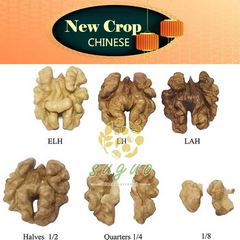How Long Do Walnuts Last?
Walnuts are not only delicious but also packed with nutritional benefits. These nutrient-dense nuts are a popular snack, a versatile ingredient in cooking and baking, and even a key component of salads. However, like most food items, walnuts have a finite shelf life.
The shelf life of walnuts can vary depending on various factors, including how they are stored and their initial quality. Generally, walnuts have a relatively long shelf life, thanks to their high oil content, which helps preserve them. Here's a breakdown of the shelf life of different types of walnuts:
In-Shell Walnuts: If you have walnuts in their shells, they can stay fresh for up to 12 months when stored in a cool, dry place. However, it's important to inspect them periodically for any signs of mold, moisture, or pests.
Shelled Walnuts: Shelled walnuts have a shorter shelf life than those in their shells. When stored in an airtight container or resealable bag in a cool, dark place, shelled walnuts can last for up to six months. To maximize their freshness, consider refrigerating or freezing them.
Refrigerated Walnuts: Storing walnuts in the refrigerator can extend their freshness. When kept in an airtight container in the fridge, shelled walnuts can stay good for up to one year. In-shell walnuts can last even longer in the refrigerator, sometimes up to two years.
Frozen Walnuts: To preserve walnuts for an extended period, freezing is an excellent option. Place walnuts in an airtight freezer bag or container, and they can stay good for up to two years.
Signs of Spoilage
To ensure you're consuming safe and fresh walnuts, it's essential to be aware of the signs of spoilage:
Off Odor: If your walnuts develop an off or rancid odor, it's a clear sign that they have gone bad.
Bitter Taste: Fresh walnuts have a mild, slightly sweet taste. If they taste bitter, it's time to discard them.
Mold or Discoloration: Any visible mold or significant discoloration on the walnuts is a strong indicator that they are spoiled and should not be eaten.
Weevil Infestation: In rare cases, walnuts can be infested by weevils or other pests. If you notice small holes in the nuts or the presence of insects, it's best to dispose of them.
Tips for Extending Walnut Freshness
To maximize the shelf life of your walnuts, follow these tips:
Proper Storage: Store walnuts in an airtight container or resealable bag to prevent exposure to air, moisture, and light.
Cool, Dark Place: Keep walnuts in a cool, dark pantry or cupboard to prevent heat and light from causing them to spoil.
Refrigeration or Freezing: If you don't plan to use walnuts within a few months, consider refrigerating or freezing them to prolong their freshness.
Use-by Date: If you purchase packaged walnuts, pay attention to the use-by or best-before date on the label and try to consume them within that timeframe.
Walnuts are a nutritious and delicious addition to your diet, but like all food items, they have a limited shelf life. By following proper storage guidelines and regularly checking for signs of spoilage, you can enjoy fresh and flavorful walnuts for an extended period. Whether you prefer them as a snack, in your morning oatmeal, or as a topping for salads, knowing how long walnuts last will help you make the most of this nutritious nut.
547
0
0



Comments
All Comments (0)